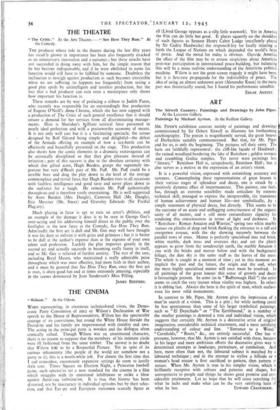THE THEATRE
" The Critic." At the Arts Theatre. " See How They Run." At
the Comedy.
THE producer whose role in the theatre during the last fifty years has stead ly grown in importance has been also frequently attacked as an unnecessary innovation and a nuisance ; but these attacks have not succeeded in doing away with him, for the simple reason that he has become indispensable, and if he were abolished in name his function would still have to be fulfilled by someone. Doubtless the inclination to inveigh against production as such becomes irresistible when we are suffering (as happens too frequently) from seeing a good play spoilt by unintelligent and tasteless production, but the fact that a bad producer can ruin even a masterpiece only shows how important his function is.
These remarks are by way of prefacing a tribute to Judith Furse, who recently was responsible for an outstandingly fine production of Eugene O'Neill's Anna Christie, which she has now capped with a production of The Critic of such general excellence that it should ensure a demand for her services from all discriminating manage- ments. Here is Sheridan's brilliant satirical farce presented in nearly ideal perfection and with a praiseworthy economy of means. It is not only well cast but it is a fascinating spectacle, the scenes designed by Rolf Gerard being simple and delightful—the defeat of the Armada offering an example of how a sea-battle can be effectively and beautifully presented on the stage. This production also shows how the comic elements in a dramatic extravaganza can be artistically disciplined so that they give pleasure instead of irritation ; part of this success is due to the absolute certainty with which that gifted actor, Hugh Burden, grasps the supremely im- portant but very difficult part of Mr. Puff. Mr. Puff could be a terrible bore and drag the play down to the level of the average commonplace and trivial farce, but Hugh Burden rises to all occasions with faultless intelligence and good taste and never plays down to the audience for a laugh. He remains Mr. Puff authentically throughout and is therefore vastly entertaining. He is well supported by Anne Burden (Mrs. Dangle), Cameron Hall (Mr. Dangle), Eric Messiter (Mr. Sneer) and Graveley Edwards (Sir Fretful Plagiary).
Much playing in farce is apt to ruin an actor's abilities, and an example of the damage it does is to be seen in George Gee's over-acting and his addressing himself direct to the public over the footlights in the new farce at the Comedy, See How They Run. Admittedly the first act is dull and Mr. Gee may well have thought it was his duty to enliven it with grins and grimaces ; but it is better to be dull at the author's expense than at the expense of your own talent and profession. Luckily the play improves greatly in the second act and actually succeeds in becoming really funny in itself, and so Mr. Gee is relieved of further anxiety. The rest of the cast, including Beryl Mason, who maintained a really admirable poise throughout which was most effective, had more faith in their author, and it must be granted that See How They Run, once the first act is over, is often good fun and at times extremely amusing, especially in the scenes dominated by Joan Sanderson's Miss Pilling.
JAMES REDFERN.






















 Previous page
Previous page